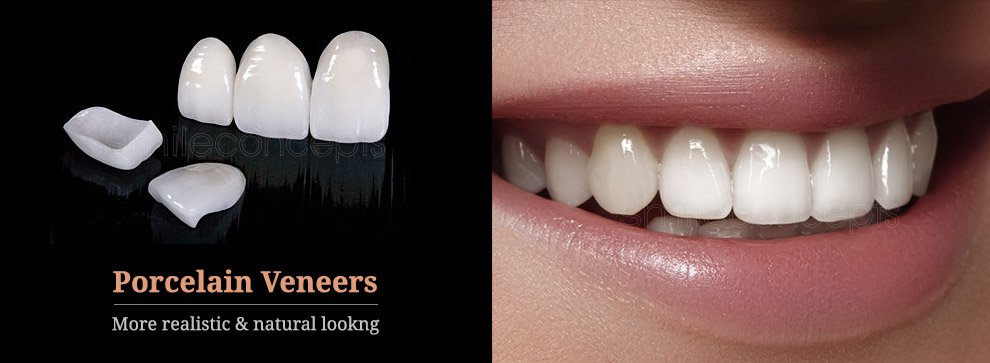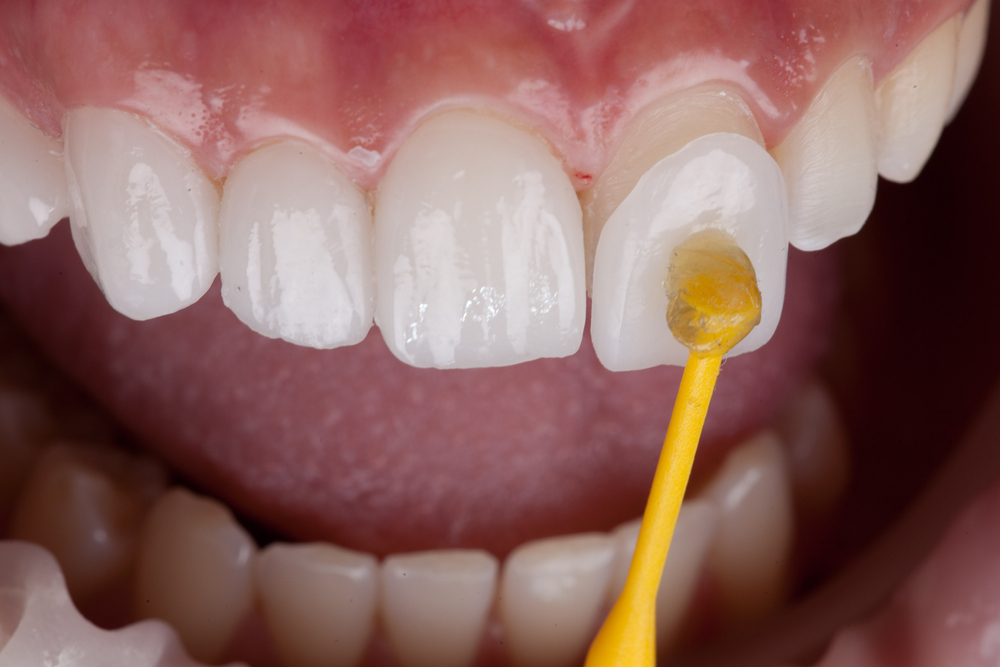Porcelain Veneers: Steps, Benefits, and Long-Term Care Tips
Wiki Article
Opening the Secrets of Veneers: Truths, Kinds, and Advantages for a Gorgeous Smile
Veneers offer an engaging service for those looking for to boost their smiles. These oral enhancements can address different blemishes, from staining to misalignment. With choices like porcelain and composite, individuals can select based upon their preferences and demands. However, recognizing the nuances of veneers, including application and treatment, is important. What elements should one think about before choosing? The responses might surprise those thinking about this visual dental option.
Understanding Veneers: What Are They?
Veneers are slim, tailor-made shells created to cover the front surface of teeth, improving their look. Typically crafted from sturdy products, these shells are customized to fit each individual's teeth precisely. They serve multiple functions, consisting of dealing with visual blemishes such as discoloration, chips, or spaces. The application process entails a dental practitioner preparing the teeth, frequently by getting rid of a little quantity of enamel to ensure a tight fit. Once prepared, the veneers are bonded to the teeth making use of a solid adhesive.Patients frequently pick veneers for their capability to develop a natural-looking smile while offering a durable option to oral blemishes. Unlike various other aesthetic dentistry choices, veneers call for minimal invasive procedures, making them a preferred choice. The outcome is a better smile that can significantly improve a person's confidence and self-esteem. Generally, veneers offer an effective strategy to achieving an extra unified and attractive dental appearance.
Kinds of Veneers: Porcelain vs. Compound
When considering cosmetic oral options, 2 key sorts of veneers stand out: porcelain and composite. Porcelain veneers are crafted from a sturdy ceramic product that mimics the all-natural look of teeth. They are recognized for their discolor resistance and capability to mirror light in a similar way to all-natural enamel, offering an aesthetic appeal that numerous individuals wish. The application procedure usually entails even more preparation of the tooth framework and might call for numerous visits to the dental expert.On the other hand, composite veneers are made from a tooth-colored material that is straight put on the teeth. This type permits for quicker application and can frequently be completed in a single go to. While they are less expensive than porcelain veneers, they may not provide the very same longevity or resistance to discoloration. Inevitably, the option in between porcelain and composite veneers depends on individual preferences, budget, and specific oral needs.
The Benefits of Choosing Veneers
Choosing veneers supplies many benefits that can considerably boost both the looks and performance of a person's smile. Among the primary benefits is their capability to correct flaws such as discoloration, voids, and misalignment, causing an extra uniform look. Veneers can additionally enhance the sturdiness of teeth, providing a protective layer that guards them from damage.Moreover, they call for minimal tooth preparation contrasted to various other dental procedures, maintaining even more of the natural tooth structure. This preservation adds to a healthier dental atmosphere while still attaining a stunning smile.
Veneers are highly adjustable, enabling individuals to pick the form, dimension, and color that ideal fits their preferences. Furthermore, they are stain-resistant, making it less complicated to maintain a attractive and brilliant smile in time. In general, veneers present a reliable alternative for those seeking both aesthetic improvement and long-lasting oral health benefits.
The Veneer Application Process
The veneer application process involves a number of essential actions to assure perfect outcomes. An examination is conducted to examine the client's needs, complied with by the preparation and shaping of the teeth. The veneers are bonded in location, with modifications made for a best fit and appearance.First Consultation Steps
An extensive initial assessment is necessary for any individual considering veneers, as it sets the foundation for an effective treatment. Throughout this meeting, the oral specialist examines the individual's oral health and wellness, going over any existing concerns that could impact the veneer application. This analysis might include X-rays and an aesthetic evaluation to determine the problem of the periodontals and teeth.The dental expert also involves the client in a detailed conversation about their aesthetic goals, preferences, and assumptions. They might present various veneer choices customized to the person's particular demands. Additionally, the professional describes the treatment, potential risks, and aftercare needs, guaranteeing that the person is knowledgeable and comfy before proceeding with the treatment.
Preparation and Shaping Teeth
After the first assessment, the following phase entails the preparation and shaping of the teeth to fit the veneers. This essential action is performed by the dental practitioner, who thoroughly examines the tooth structure to establish the amount of enamel that needs to be removed. Commonly, a slim layer, generally around 0.5 millimeters, is slashed off to guarantee an appropriate fit for the veneers. Precision is vital throughout this process, as it influences both the general comfort and the aesthetic result. When the teeth are appropriately shaped, perceptions are taken to produce custom veneers that align perfectly with the client's oral account. This careful prep work sets the phase for an effective veneer application, boosting both look and feature.Bonding and Last Modifications
Adhering to the shaping and prep work of the teeth, the bonding process starts, marking an important stage in the veneer application. Throughout this phase, an oral adhesive is used to the prepared tooth surface, ensuring a strong bond between the veneer and the tooth. The dental practitioner thoroughly places the veneer, making modifications to accomplish the preferred alignment and looks. When correctly placed, a special light is utilized to cure the glue, strengthening the bond. After curing, the dental practitioner performs last modifications, cutting any excess product and fine-tuning the veneer's form to guarantee a natural appearance. This cautious focus to detail improves both function and aesthetics, adding to a general beautiful smile that is durable and durable.Taking care of Your Veneers: Maintenance Tips
Taking care of veneers is important to maintain their appearance and longevity. A consistent everyday cleaning regimen, mindful evasion of tarnishing foods, and normal dental exams are essential parts of reliable maintenance. These techniques aid ensure that veneers continue to be in peak problem and remain to improve one's smile.Daily Cleansing Regimen
Routinely keeping veneers is vital for their long life and appearance. A proper day-to-day cleaning routine can assist preserve their sparkle and stop damages. Dental professionals recommend cleaning two times a day with a soft-bristled toothbrush and fluoride toothpaste, making certain that all surface areas are cleaned delicately to stay clear of scraping the veneer surface. Flossing daily is likewise vital to get rid of food bits and plaque from in between teeth, where brushes may not reach. Furthermore, using an antimicrobial mouthwash can aid maintain dental hygiene without click here for info harming the veneers. It is advisable to prevent abrasive cleaners and tools that can scrape the veneer. By adhering to these basic actions, people can maintain their veneers looking gorgeous while promoting overall oral health and wellness.Avoiding Discoloration Foods
Although veneers are designed to enhance the appearance of teeth, their vulnerability to tarnishing demands mindful nutritional selections. It is vital for individuals with veneers to be mindful of certain foods and beverages that can lead to discoloration. Dark-colored items such as coffee, merlot, and berry juices must be consumed in small amounts, as they are understood to discolor both natural teeth and veneers. Additionally, acidic foods like citrus fruits canister compromise the bonding representatives utilized in veneers, making them more susceptible to staining. To additional resources maintain an intense smile, it is a good idea to rinse the mouth with water after eating discoloration foods and to exercise routine oral hygiene. These thoughtful selections contribute considerably to the durability and visual appeals of veneers.
Regular Dental Examinations

Preserving the honesty of veneers requires a commitment to regular dental check-ups, as these consultations play a vital duty in guaranteeing their longevity and appearance. During these sees, oral experts can examine the problem of the veneers, looking for any type of indications of wear, damages, or underlying dental issues. In addition, routine cleanings aid remove plaque and tartar that can accumulate around the veneers, advertising total dental wellness. Dental professionals can also supply tailored suggestions on treatment methods and items fit for veneer maintenance. By sticking to a schedule of exams, people can attend to potential issues early, guaranteeing their smile remains dynamic and beautiful. Eventually, routine oral visits are a crucial element of veneer treatment.
Is Veneers the Right Option for You?
Determining whether veneers are the right alternative commonly rests on specific visual goals and dental requirements. For those seeking to resolve issues such as discoloration, chips, or imbalance, veneers can supply a transformative service. Prospects usually include people with healthy teeth yet want an improved smile.
It is crucial to take right into account elements such as tooth enamel problem, the degree of oral issues, and the readiness to keep veneers. Consulting with a dental professional is vital, as they can review oral wellness and figure out if veneers are appropriate
In addition, possible prospects need to review the long-term commitment, as veneers may need substitute every 10-15 years. Cost factors to consider also play a significant function, as veneers can be a considerable financial investment. Eventually, the decision should be knowledgeable, balancing aesthetic needs with functional considerations for enduring outcomes.
Often Asked Inquiries
For How Long Do Veneers Typically Last Before Requiring Substitute?
Veneers usually last in between 10 to 15 years prior to needing replacement. Aspects such as dental health, way of living selections, and material high quality can influence their longevity, making regular oral examinations crucial for maintaining their condition.Are Veneers Safe for People With Delicate Teeth?
Veneers can be safe for people with delicate teeth, but it commonly relies on the seriousness of level of sensitivity and the dentist's method. Consulting an additional resources oral specialist prior to proceeding is vital to assure ideal results.Can Veneers Be Eliminated or Changed Conveniently?

Do Veneers Spot Over Time, and How Can I Avoid It?
Veneers can discolor in time, specifically from foods and beverages like coffee or merlot. To avoid discoloration, preserving good oral hygiene, utilizing a straw for drinks, and routine dental cleanings are suggested practices.What Is the Cost Range for Getting Veneers?
The price of veneers generally ranges from $500 to $2,500 per tooth, depending upon variables such as material type, dental expert experience, and place. People should talk to oral specialists for personalized quotes and financing alternatives.When the teeth are sufficiently shaped, impressions are taken to develop personalized veneers that straighten completely with the individual's oral account. During this phase, an oral adhesive is applied to the ready tooth surface, ensuring a solid bond between the veneer and the tooth. It is essential to take right into account aspects such as tooth enamel condition, the level of oral concerns, and the willingness to maintain veneers. Veneers can be risk-free for individuals with delicate teeth, yet it commonly depends on the intensity of sensitivity and the dentist's strategy. The cost of veneers generally varies from $500 to $2,500 per tooth, depending on elements such as product type, dental practitioner experience, and location.
Report this wiki page